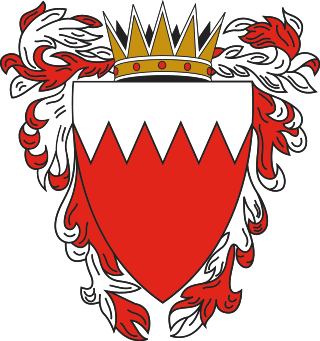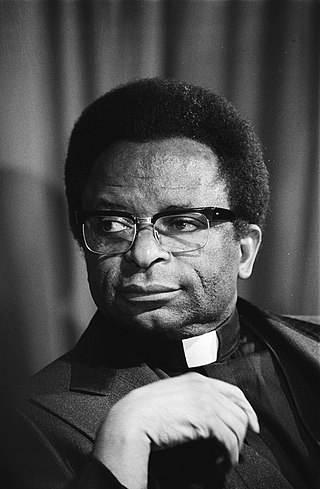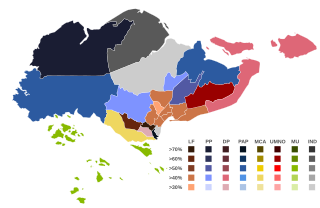
Politics of Bahrain has since 2002 taken place in a framework of a constitutional monarchy where the government is appointed by the King of Bahrain, King Hamad bin Isa Al Khalifa. The head of the government since 2020 is Crown Prince Salman bin Hamad Al Khalifa, who became Prime Minister following the death of Khalifa bin Salman Al Khalifa, and who also serves as Deputy Commander of the Bahrain Defence Force. The parliament is a bicameral legislature, with the Council of Representatives elected by universal suffrage, and the Consultative Council appointed directly by the king.

A member of parliament (MP) is the representative in parliament of the people who live in their electoral district. In many countries with bicameral parliaments, this term refers only to members of the lower house since upper house members often have a different title. The terms congressman/congresswoman or deputy are equivalent terms used in other jurisdictions. The term parliamentarian is also sometimes used for members of parliament, but this may also be used to refer to unelected government officials with specific roles in a parliament and other expert advisers on parliamentary procedure such as the Senate parliamentarian in the United States. The term is also used to the characteristic of performing the duties of a member of a legislature, for example: "The two party leaders often disagreed on issues, but both were excellent parliamentarians and cooperated to get many good things done."
A by-election, also known as a special election in the United States and the Philippines, a bye-election in Ireland, and a bypoll in India, is an election used to fill an office that has become vacant between general elections.

Angela Evans Smith, Baroness Smith of Basildon is a British politician and life peer serving as Leader of the Opposition in the House of Lords since 2015. A member of the Labour and Co-operative parties, she was Member of Parliament (MP) for Basildon from 1997 to 2010.

General elections were held in Fiji between 15 and 29 April 1972, the first since independence from the United Kingdom in 1970. They were characterised by the lack of rancour between racial groups, typical of the 1966 general election and the 1968 by-elections.
James J. Bradley is a politician in Ontario, Canada. He was a long-serving Liberal member of the Legislative Assembly of Ontario, sitting as an MPP from 1977 until 2018. He represented the riding of St. Catharines and served in the provincial cabinets of David Peterson, Dalton McGuinty and Kathleen Wynne. He was elected as a regional councillor in the St. Catharines municipal election of 2018. He is currently the Chair of the Regional Municipality of Niagara.

Elections in Kenya take place within the framework of a multi-party democracy and a presidential system. The President, Senate and National Assembly are directly elected by voters, with elections organised by the Independent Electoral and Boundaries Commission (IEBC).

Elections in Montserrat take place within the framework of a multi-party democracy and a parliamentary system. The Legislative Assembly is directly elected, and a Chief Minister is selected by the party or coalition with the most seats in the Assembly.

Bahrain has had two constitutions in its modern history. The first one was promulgated in 1973, and the second one in 2002.

The Council of Representatives, sometimes translated as the "Chamber of Deputies", is the name given to the lower house of the Bahraini National Assembly, the national legislative body of Bahrain.

The House of Representatives is the lower house of the National Assembly of Thailand, the legislative branch of the Thai government. The system of government of Thailand is that of a constitutional monarchy and a parliamentary democracy. The system of the Thai legislative branch is modelled after the Westminster system. The House of Representatives has 500 members, of which 400 are elected through single member constituency elections, while the other 100 are chosen through party lists parallel voting.

General elections were held in Rhodesia in April 1979, the first where the majority black population elected the majority of seats in parliament. The elections were held following the Internal Settlement negotiated by the Rhodesian Front government of Ian Smith and were intended to provide a peaceful transition to majority rule on terms not harmful to White Rhodesians. In accordance with the Internal Settlement, on 1 June, Rhodesia officially became the nation of Zimbabwe Rhodesia, under the government of the United African National Council elected in the 1979 elections. The Internal Settlement was not approved internationally but the incoming government under Bishop Abel Muzorewa did decide to participate in the Lancaster House talks which led to the end of the dispute and the creation of Zimbabwe.

General elections were held in Malaysia between Saturday, 24 August and Saturday, 14 September 1974. Voting took place in all 154 parliamentary constituencies of Malaysia, each electing one Member of Parliament to the Dewan Rakyat, the dominant house of Parliament. State elections also took place in 360 state constituencies on the same day. The elections were the first and only general elections for Tun Abdul Razak as Prime Minister following his appointment to the position in 1970. They were also the first general elections for Barisan Nasional (BN), a new political alliance replacing the Alliance Party; with the Pan-Malaysian Islamic Party (PAS), Parti Gerakan Rakyat Malaysia (PGRM) and the People's Progressive Party (PPP) joining the parties from the old Alliance.

The prime minister of Zimbabwe was a political office in the government of Zimbabwe that existed on two occasions. The first person to hold the position was Robert Mugabe from 1980 to 1987 following independence from the United Kingdom. He took office when Southern Rhodesia became the Republic of Zimbabwe on 18 April 1980. This position was abolished when the constitution was amended in 1987 and Mugabe became president of Zimbabwe, replacing Canaan Banana as the head of state while also remaining the head of government. The office of prime minister was restored in 2009 and held by Morgan Tsvangirai until the position was again abolished by the 2013 Constitution of Zimbabwe.

General elections were held in Singapore on 2 April 1955 to elect members to the 25 elected seats in the Legislative Assembly. Nomination day was on 28 February 1955.
Naomi Namsi Shaban is a Kenyan politician from the border town of Taveta. Born of pare descent she became the first woman elected to represent the Taveta Constituency in Parliament in 2002 through a Kenya African National Union (KANU) ticket. She defended the seat in 2007 election through KANU and won. Later she joined the National Alliance Party (TNA) and was re-elected to represent Taveta Constituency in the National Assembly of Kenya in 2013. In 2017 she was re-elected again for a record fourth term in a highly controversial way as her main opponent Morris Mutiso cried foul play and sought for the results to be annulled on grounds of irregularities and illegalities.
General elections were held in Qatar for the first time on 2 October 2021, following an announcement by the Emir of Qatar on 22 August 2021. The elections for the Consultative Assembly were originally scheduled for the second half of 2013, but were postponed in June 2013 until at least 2016. In 2016 they were postponed again. Finally, in November 2020, Emir Tamim bin Hamad Al Thani pledged to hold the election in October 2021.
The first municipal council in Qatar was formed in the early 1950s and it was reorganized in 1956. Doha municipality came into being in May 1963. The Ministry of Municipal Affairs was established in 1972 as a government body responsible for supervising the functions of municipalities.

General elections were held in Bahrain in November 2014 to elect the forty members of the Council of Representatives. The first round of voting took place on 22 November, with a second round on 29 November in the 34 constituencies in which no candidate received a majority.

General elections were held in Dominica on 8 December 2014 to elect the 21 members of the House of Assembly. Prime Minister Roosevelt Skerrit announced the election date on 5 November 2014 and Nomination Day was held on 19 November. Under Dominica's electoral system, the Prime Minister has the authority to call elections at any time and is only required to give a minimum of twenty-five days' notice.













